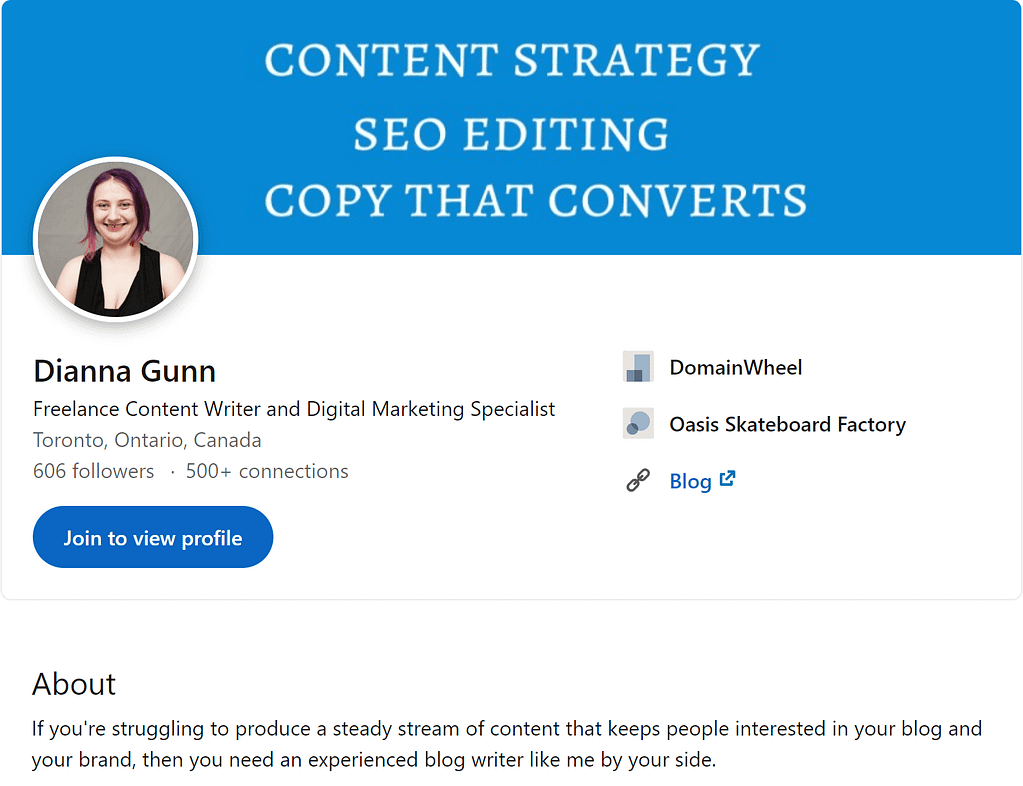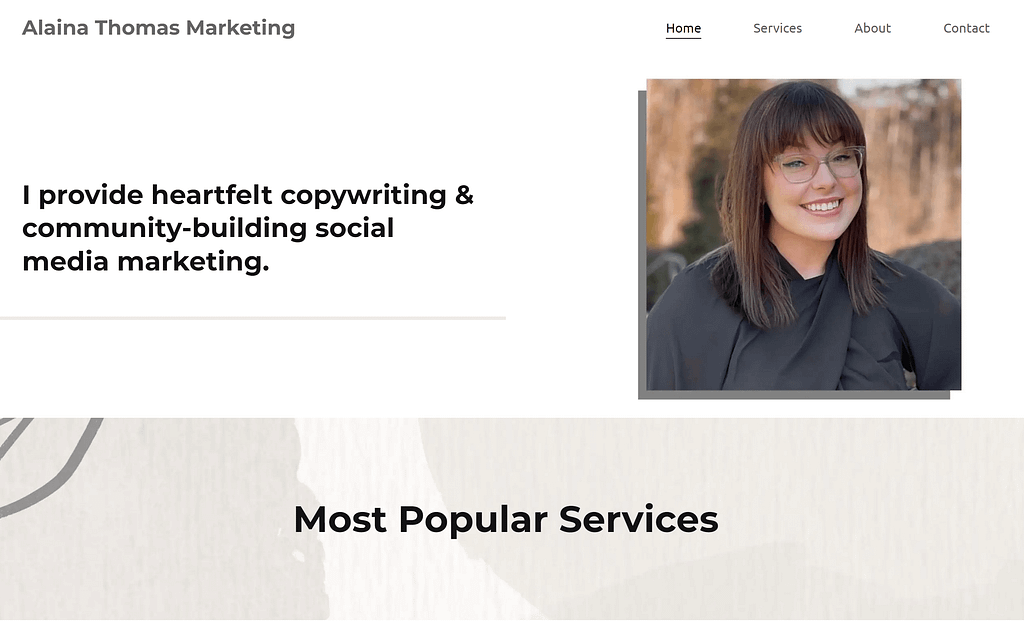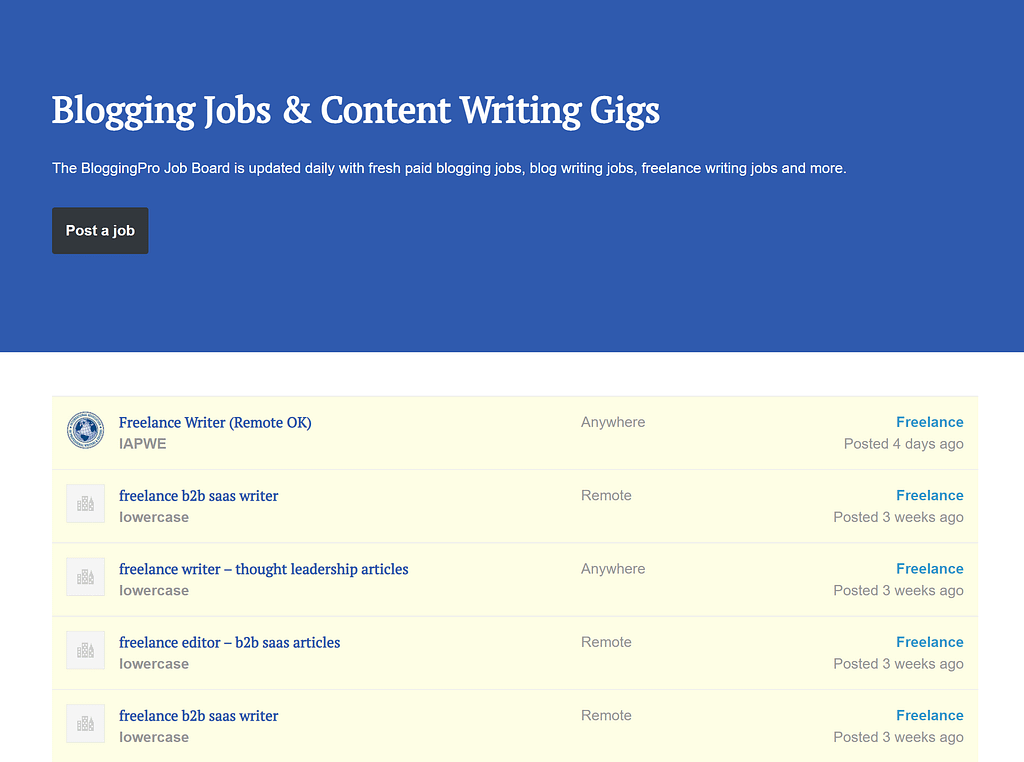[ad_1]
If you want to become a freelance writer, you’ve come to the right place. This guide will teach you how to start freelance writing. I will explain everything you need to know – all rooted in my experience as a freelance writer.
First, we’ll start with the reasons you might want to try your hand at freelance writing, ✍️ and then, we’ll hop on to exploring the four key steps to starting your business:
Let’s get started!
Why should you become a freelance writer?
There are many benefits to being a freelance writer, including:
- Freedom. You control your hours, the types of assignments you take on, and how you work with clients. You get to decide if you do a few assignments a month or make it your full-time career. If it’s the latter, you’ll also be able to skip the commute and work anywhere with an internet connection.
- Opportunity. While it’s hard to pin down exact numbers, there are freelance writing opportunities in every industry. There is also a multitude of things you can write, from short forms, like product descriptions, all the way up to books.
- Creativity. Even technical writing requires a certain level of creativity in the way you present information. This allows you to build your creative skills and keeps the job from getting stale.
You can also learn a lot as you get hired to write about new topics.
In short, freelance writing can be everything you want in a business: fun, challenging, and of course, lucrative.
How to start freelance writing
Understand the types of jobs available 👨💻
There are many types of freelance writing jobs, all with different requirements and pay scales.
Some of the most common jobs for freelance writers are:
- Web content writer. This is someone who creates the written content for things like a homepage, about page, and other essential content. To work as a web content writer, you must be familiar with the rules of writing for the internet and how to add content to a website. You may also be required to know Search Engine Optimization (SEO).
- Blog writer. This person writes blog posts like the one you’re reading right now! They often work for the same clients month after month, helping companies keep a regular posting schedule. To work as a blog writer, you’ll need a strong understanding of SEO, a basic understanding of blogging platforms like WordPress, and a knack for writing conversational pieces.
- Copywriter. This person creates the text for marketing campaigns. They may also create product descriptions and other permanent marketing text. To work as a copywriter, you must be good at persuasive writing. You may also need to understand SEO.
- Technical writer. This person writes things like online tutorials, product documentation, and guidebooks. To work as a technical writer, you must be good at distilling complex topics and processes into language that is easy for readers to understand. You can check out our guide to how to become a technical writer to learn more about this career path.
- Ghostwriter. This person writes content meant to be published under someone else’s name, often charging a higher rate in exchange for giving up the byline. To work as a ghostwriter, you must be willing to forego having a byline on the pieces you write. You’ll also need to be able to adapt your writing style to suit the needs of each new project.
Once you understand the types of jobs available, you can figure out the best job for your skill set and goals. For example, if you’re good at persuasive writing, copywriting might be the best choice for you.
Choose a niche 🤼
The next step in how to start freelance writing is to choose a niche. This is the topic you’ll focus the majority of your writing on. For example, my own writing niche is online entrepreneurship.
Focusing your efforts on one niche allows you to position yourself as an expert. You can then leverage your expert status to find bigger and better jobs.
There are a few things to consider when choosing your niche:
- Your qualifications. If you have a degree or professional experience in a specific industry, you can use those qualifications to position yourself as an expert right away.
- Your interests. You want to choose a niche you find interesting enough to write about for years to come. You also want to choose something broad enough that you’ll be able to write dozens or even hundreds of pieces about.
- The opportunities. Some niches have more opportunities than others. You’ll also find that you can earn more by writing in specialized niches like healthcare.
Note that choosing a niche doesn’t mean you can only write about that topic. You can always apply for one-off jobs or submit to markets outside of the main scope of your interest. The key is to minimize those jobs and focus your portfolio on positioning yourself as an expert in one field.
Which brings us perfectly to the next step in how to start freelance writing:
Build your portfolio 🖼️
Your portfolio is like an online resume, a space where potential clients can see your past work.
There are two steps to building your portfolio: gathering samples and building your page.
1. Gather samples
You’ll need samples of your writing to display. There are a few ways to get these:
- Pitch guest posts. Find some blogs in your niche that accept guest posts. Most of these opportunities are unpaid, but you can also find many blogs that pay for guest posts.
- Offer to write for small businesses or nonprofits. You can offer to overhaul content for a small business or nonprofit related to your niche at a free or heavily discounted rate. This can give you published writing to display in your portfolio and testimonials to help you land future clients.
- Start a blog. A relevant blog is a great way to showcase your expertise, passion for your subject, and writing skills. It also shows an understanding of blogging tools, which can be helpful in applying for certain jobs. And there are several blogging courses that are great for getting you started!
I recommend combining two or more of these strategies to amass a variety of writing credits and to build a reputation within your writing niche.
2. Build your page
You can build your portfolio in two ways: as a page on LinkedIn or another professional networking site, or as a self-hosted website.

LinkedIn and other professional networking sites are great for connecting with both colleagues and potential clients. Customization options are limited on these sites, but you can set up these profiles for free in a matter of minutes.

A self-hosted website is more complicated to set up, but it gives you more control over the appearance of your portfolio. You can also use a self-hosted website to house a blog and build it up with SEO to attract more clients. Bluehost is a very popular hosting provider that many people use for this purpose.
I recommend using both of these options. A LinkedIn profile is a great way to attract potential work, but you can’t beat the flexibility of a self-hosted website. Moreover, there’s always a chance that LinkedIn might disappear someday. You don’t want to be left without an online platform if it does.
Now, if you don’t want to do hours of research to find a hosting company, you can always go with Bluehost. They are a very well-known, reputable hosting provider that many freelance writers and bloggers rely on.
Regardless of your platform, there are a few things you’ll need to build your portfolio:
- A professional headshot. You want to establish yourself as a real, trustworthy person.
- An “About” blurb. This is a 2-5 paragraph explanation of what your experience is, what professional services you offer, and how those services help your clients.
- An area to display samples. Include a link to pieces published online where possible. If the pieces aren’t online, scan the printed materials or copy-and-paste the content into a Google Doc.
- An area for testimonials. Every time you write for someone, ask them to share a line or two about what they liked about your work. You can then publish these quotes. Make sure to include the name of the person giving the testimonial and the company they work for.
Take your time to perfect each section of your portfolio, especially the “About” blurb. Your bio is the perfect place to display your writing skills, even before people click through to your samples.
When your portfolio is ready, you can move on to the final step of how to start freelance writing:
Apply for jobs 🧑💼
There are two different approaches you can take to finding writing work:
Submit to paid markets
Magazines and high-profile blogs often accept a certain amount of freelance work each publishing period. There’s also a level of prestige you can gain by writing for these platforms, especially if they’re nationally or internationally recognized.
The downside of this approach is that you’ll need to create and pitch your own ideas. You may even be required to submit a first draft, meaning that you’ll write pieces with no guarantee of payment or publication. To top it all off, you might wait several months for a response to your submission.
Apply for jobs
There are many job boards specifically for writers. Most of them work similarly to more generic job boards: you see a job you’re interested in, fill out a form, include a link to your portfolio, add a cover letter, and submit your application.
Not all writing jobs are created equal, though. There are some things you’ll want to avoid:
- Any job where the pay rate (or potential pay scale if it’s variable) isn’t listed
- “Content mill” pay rates – even as a beginner, you should be paid more than $10 per 500 words
- Any job that requires you to write an unpaid sample
These jobs aren’t necessarily scams, but they are typically low-value clients. They care more about getting cheap content than they do about quality or fostering good relationships with their writers.
To find high-quality jobs, 👔 check out the BloggingPro job board. Employers must pay to post a job on our job board, which helps weed out low-quality jobs and scams. You can also sign up for our newsletter to get job listings delivered to your inbox each week.

Final advice on how to start freelance writing 🎯
Freelance writing can be an excellent way to build a secondary income or even turn it into a full-time career. With all of the flexibility it offers, you’ll find a better work-life balance, and you’ll be able to enjoy the rest of your life, too.
To recap, you can get started as a freelance writer in four steps:
- Understand the types of jobs available 👨💻
- Choose a niche 🤼
- Build your portfolio 🖼️
- Apply for jobs 🧑💼
Hopefully that answered all of your questions about how to start freelance writing. Now it’s time to head on over to our job board and put your newfound knowledge to use. And don’t forget to sign up for our newsletter!
[ad_2]
Source link

